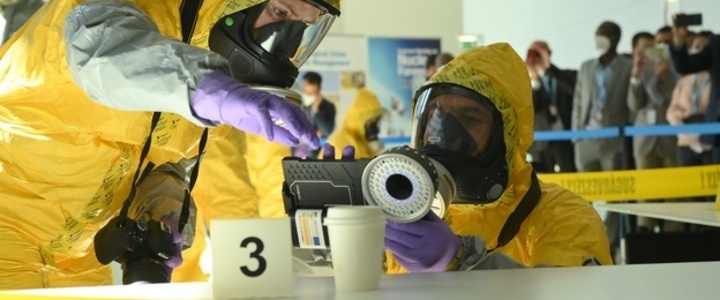
HUN-REN Centre for Energy Research
Hungary
Περίληψη:
Based on the definition of the International Atomic Energy Agency: “is the examination of nuclear or other radioactive material, or of evidence contaminated with radionuclides, in the context of legal proceedings under international or national law related to nuclear security.” (IAEA Nuclear Security Series, No. 2G, 2015). Nuclear forensics plays a crucial role in supporting criminal investigations and prosecutions by providing scientific evidence that can help to identify linkages among people, places, events and the nuclear or other radioactive material with unknown origin, was found, confiscated at border stations, collected as evidences at crime scenes and tried to be used for malicious acts. Nuclear forensics can also provide information about smuggling roots of nuclear or other materials or weaknesses of the security system of nuclear facilities. By examining specific characteristic parameters of nuclear materials originating from the nuclear fuel production such as the isotopic composition, chemical signatures, and unique properties of radioactive materials, nuclear forensics helps identify the perpetrators of illicit nuclear trafficking, sabotage, or terror attacks, and offers crucial evidence in court for prosecution. In connection with radiological crime scene management, nuclear forensics is vital in ensuring that crime scenes are handled with the appropriate care to preserve forensic evidence. Radiological crime scenes are often contaminated with radionuclides that require specialized procedures for safety and contamination control. Effective crime scene management ensures that forensic analysis can be conducted without compromising the integrity of the evidence. Furthermore, collaboration between law enforcement, forensic experts, and radiological experts is essential to link the radioactive evidence to larger criminal investigations, enhancing the ability to prosecute cases involving nuclear and radiological crimes.
The HUN-REN Centre for Energy Research has 30 years experiences in nuclear forensics related examination of around 25 real cases in Hungary the past 3 decades. Wide spectrum of analytical techniques and different expertise supporting the nuclear forensic examination at the HUN-REN EK as nuclear forensics is a multidisciplinary area. New research at the HUN-REN EK is focusing on signature study of sealed radioactive sources and development of novel technologies for origin assessment of nuclear materials found at radiological crime scenes.
Σύντομο βιογραφικό:
Dr. Eva Szeles holds a PhD degree on Analytical Chemistry. Her background is radiochemistry and analysis of nuclear materials by mass spectrometry. Presently, Dr. Szeles is working at the HUN-REN Centre for Energy Research in Hungary as special scientific advisor on nuclear security of materials outside of regulatory control (MORC) including multi-agency response to criminal and other intentional unauthorized acts involving MORC, radiological crime scene management, nuclear forensics and criminal prosecution of RN crimes. Dr. Szeles is supporting to strengthen the Hungarian national security strategies, multi-agency cooperation and regional and international capacity building on security. Her expertise is also covering training and exercise development.
Dr. Szeles was the head of the Hungarian National Nuclear Forensics Laboratory and the IAEA Collaborating Centre for Nuclear Forensics between 2013-2020. Between 2020-2023, Dr. Szeles was the head of the Crime Scene Management and Nuclear Forensics Unit at the Division of Nuclear Security of the IAEA. Her duties covered the support of IAEA Member States to build capacity on crime scene management and nuclear forensics.



